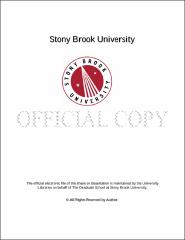| dc.identifier.uri | http://hdl.handle.net/11401/78364 | |
| dc.description.sponsorship | This work is sponsored by the Stony Brook University Graduate School in compliance with the requirements for completion of degree | en_US |
| dc.format | Monograph | |
| dc.format.medium | Electronic Resource | en_US |
| dc.format.mimetype | Application/PDF | en_US |
| dc.language.iso | en_US | |
| dc.type | Dissertation | |
| dcterms.abstract | This dissertation explores films that represent the Parisian banlieue (suburban ‘ghettos’) as a transnational space in two distinct periods: the early 1960s, when U.S. popular culture and French colonialism in North Africa acutely affected the banlieue; and the post-9/11 period, in which Islamophobic discourses and policies proliferated in the West, rendering the banlieue an increasingly stigmatized space. “Cruel Paris” investigates how films invoke intertexts and re-inscribe genres to narrate the banlieue as a site of transnational negotiation, telling local stories that impel the spectator to envision France as a (post)colonial, transcultural community. Far from a utopian representation, this depiction critiques the exclusionary ideology of French Republican universalism—the imperative to value the citizen’s ‘abstract’ individualism and national identity over religious, ethnic, and gender identities in the public sphere. I argue that films of both time periods reveal the banlieue as a carceral space that contains and controls bodies that have been socially constructed as non-universal, i.e. marked as non-white, non-Catholic, or otherwise inadequate for universalization. While scholars have used postcolonial theories to illustrate how banlieue films reflect the multi-ethnic reality of contemporary France, this lens does not necessarily include the analytical category of gender. In contrast, “Cruel Paris” employs transnational feminist theories to examine interrelations among (anti)racist, (anti)colonial, and (anti)feminist representations in an extended study of banlieue films. Precisely because of its postcolonial theoretical inheritance, transnational feminism warns against using ‘women’s rights’ discourses for racist ends; it maintains that sexism is prevalent in all cultures, yet manifests in different ways; and it acknowledges that the meanings and experiences of intersectional identities and oppressions shift according to context. I closely analyze key films—The Wasteland (1960), Octobre à Paris (1962), L’Esquive (2004), Caché (2005), and Skirt Day (2009)—to uncover the structural racism, Islamophobia, and sexism that the spatial marginalization of the Parisian banlieue reifies. In representing the banlieue as causally linked to the interlocking histories of French settler colonialism in Algeria and U.S. cultural imperialism, these films expose integration as a cruel promise by demonstrating that assimilation is necessary—yet often impossible—for the mobility of non-universal French citizens. | |
| dcterms.available | 2018-07-09T14:23:27Z | |
| dcterms.contributor | Pérez Melgosa, Adrián | en_US |
| dcterms.contributor | Montegary, Liz | en_US |
| dcterms.contributor | Amin, Kadji. | en_US |
| dcterms.contributor | Sellier, Geneviève. | en_US |
| dcterms.creator | Schaefer, Joy Carolann | |
| dcterms.dateAccepted | 2018-07-09T14:23:27Z | |
| dcterms.dateSubmitted | 2018-07-09T14:23:27Z | |
| dcterms.description | Department of Comparative Literary and Cultural Studies. | en_US |
| dcterms.extent | 306 pg. | en_US |
| dcterms.format | Monograph | |
| dcterms.identifier | http://hdl.handle.net/11401/78364 | |
| dcterms.identifier | Schaefer_grad.sunysb_0771E_13402.pdf | en_US |
| dcterms.issued | 2017-08-01 | |
| dcterms.language | en_US | |
| dcterms.provenance | Submitted by Jason Torre (fjason.torre@stonybrook.edu) on 2018-07-09T14:23:27Z
No. of bitstreams: 1
Schaefer_grad.sunysb_0771E_13402.pdf: 126923712 bytes, checksum: bdc2c6db94e28a51fa372c4d9f3411fa (MD5) | en |
| dcterms.provenance | Made available in DSpace on 2018-07-09T14:23:27Z (GMT). No. of bitstreams: 1
Schaefer_grad.sunysb_0771E_13402.pdf: 126923712 bytes, checksum: bdc2c6db94e28a51fa372c4d9f3411fa (MD5)
Previous issue date: 2017-08-01 | en |
| dcterms.subject | Motion pictures | |
| dcterms.subject | Banlieue | |
| dcterms.subject | Caché | |
| dcterms.subject | Postcolonialism in motion pictures | |
| dcterms.subject | Feminism | |
| dcterms.subject | French Studies | |
| dcterms.subject | Octobre à Paris | |
| dcterms.subject | Islamophobia | |
| dcterms.subject | Skirt Day | |
| dcterms.subject | The Wasteland | |
| dcterms.title | Cruel Paris: Transnational Feminist Approaches to Banlieue Cinema | |
| dcterms.type | Dissertation | |

